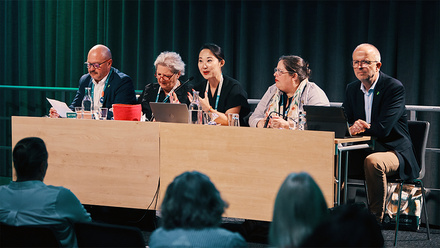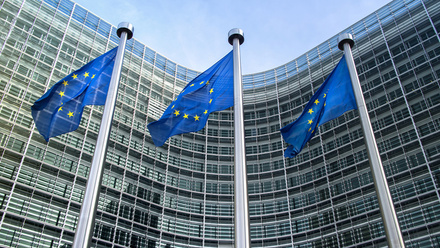Shaping the future with trust and connectedness

It feels like we are living in the interim: the past appears distant and the future has not yet emerged. It is almost like when a sculptor beats a metal sheet into a new shape – a sheet of metal can take a beautiful shape, but in the interim it is beaten, stretched, contorted, deformed. We are in that phase now as the pandemic rages on across the globe. Can we withstand this immense pressure or will the metal break into pieces? What can we do to build more resilience to withstand this incessant beating? What can we do to use this interim to emerge in a shape better than before – a beautiful shape?
The peculiarity of this pandemic is that we are being forced to abandon public spaces, be confined to our bubbles for long periods of time and maintain distance – things we were not used to, things that can tear us apart. Yet, in a way, this unites us, as it is the most widely shared experience across the world. It is like a single soap opera involving everyone on earth, irrespective of their nationality, race, caste or creed. Emerging with a beautiful shape is not guaranteed. Nor will it be easy. We must actively work towards a better world.
We will have to decisively shift from hierarchy, power and position to shared planning and decision-making
There are two critical elements to this. In this period of crisis, we will have to move forward by regaining and developing trust – between individuals, between segments of societies, within organisations and across organisations. We also have to develop a greater sense of connectedness. We will have to understand that we, as humans, share the same destiny. If we can, the resilience we build will see us through.
Shared leadership
While every individual will have to work to increase trust, the onus is much higher on leaders at all levels. Leading in times of change and crisis requires multiple trust levels between individuals, organisations and leadership teams. Resilience can be developed only if one knows how to promote trust, empathetic listening, authenticity and patience. We will have to decisively shift from hierarchy, power and position to shared planning and decision-making. This will lead to a new model of shared leadership.
Traditional leadership focused on developing the capacity of leaders to influence followers, whereas shared leadership will be about producing direction, alignment and commitment in organisations and institutes. With trust, direction, alignment and a shared commitment to common goals, organisations have the ability to make decisions in teams. In today’s world, solutions to adaptive challenges lie in the collective intelligence of stakeholders at all levels.
Adaptability in times of crisis can only be enhanced by trust
"Adaptive work is required when our deeply held beliefs are challenged, when the values that made us successful become less relevant and when legitimate yet competing perspectives emerge," said Heifetz and Laurie in 2001. Today, when we are experiencing the same challenge in every area of life, it is critical to mobilise teams to adapt their behaviour in order to thrive in the ‘new normal’.
Leon C. Megginson once said: "According to Darwin’s Origin of Species, it is not the most intellectual of the species that survives; it is not the strongest that survives; but the species that survives is the one that is able best to adapt and adjust to the changing environment in which it finds itself." Adaptability in times of crisis can only be enhanced by trust.
Strong communication
The other aspect of resilience is connectedness. In times where even travelling between neighbourhoods may not be possible, how do we connect across universities spread across nations? This is a very important function of international offices in educational institutions around the world: helping us to stay connected. We are all experiencing narrowed boundaries and practising social distancing. This is a disruptive phenomenon as humans are meant to be socially inclusive and not socially distant. In particular, academic pursuit and advancing the frontier of knowledge needs a community. This is a window of opportunity to collaborate and not compete, to innovate and not isolate, to empathise and not disregard.
At the Office of International Partnerships at Shiv Nadar University, India, we envision a world unbroken by boundaries and walls. Under these conditions, we are reimagining academic and intellectual connectedness, extending the physical space digitally and leveraging partner ecosystems. We hosted interactive sessions with our partners across the world in our webinar series called Beyond Boundaries. This culminated in partnerships, pathways and processes that led to connected learning around the impacts of COVID-19 on areas such as education, economy, health and society.
How do we enhance trust and connectedness? At the Office of International Partnerships, we adapted to the new normal firstly by focusing on communication: we connected and communicated with each international student on campus and each prospective student to ensure their well-being. We realised that communication was crucial in times of crisis and change because students were apt to be insecure and misinformation can spread quickly.
Creative solutions
When travelling is fraught with peril and meeting someone can cause anxiety, internationalisation seems to be in danger. Further, rising nationalism and tribalism have put the broader idea of globalisation in question. But that is, in fact, what makes internationalisation so much more important: it has the potential to break down these newly erected barriers and bring everyone together. However, in the short term at least, higher education institutions need to come together and expand the idea of transnational education.
In the short term at least, higher education institutions need to come together and expand the idea of transnational education
The British Council, in its Going Global report of 2013, defined transnational education as "a component of the wider phenomenon of the internationalisation of education". It said that "the general principle of transnational education is that students can study towards a foreign qualification without leaving their home country; meaning that the programmes and providers cross national and regional borders, not generally the student". This presents an opportunity for educators across borders to collaborate and create experiential learning for students and provide them with global exposure. While there is so much uncertainty around travel and mobility in the near future, this is a creative solution to enable people to experience internationalisation and build resilience by increasing trust and connectedness.
We are in the process of creating history as we devise new methods of internationalisation, collaboration and resilience for our future generations. Let us consider this crisis as a bend in the road and not the end of the journey. Together, we shall carve a path forward to help everyone navigate and manoeuvre these difficult times. Trust and connectedness can together form the beacon that leads us along the right path. Let us hope that a beautiful shape emerges out of these trying times.






